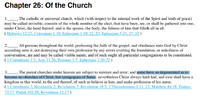TryingToLearn
Puritan Board Freshman
1) What is essentially required for a valid baptism?
2) Would any private baptisms be valid? If not, what essential requirement does it lack? If so, why?
3) Would two random christians baptizing each other in the pool be valid (assume they’re genuine in intent and not joking)? If not, what essential requirement does it lack?
4) What of the above situation but one is a minister?
5) Would baptism by the laity, even a woman, in the context of public worship be valid? If not, what essential requirement does it lack?
6) What is essentially required for a valid Lord’s Supper?
7) What essential requirement does the Mass lack which invalidates it? (If it is withholding of the cup, then if it was allowed, would it then be valid?)
2) Would any private baptisms be valid? If not, what essential requirement does it lack? If so, why?
3) Would two random christians baptizing each other in the pool be valid (assume they’re genuine in intent and not joking)? If not, what essential requirement does it lack?
4) What of the above situation but one is a minister?
5) Would baptism by the laity, even a woman, in the context of public worship be valid? If not, what essential requirement does it lack?
6) What is essentially required for a valid Lord’s Supper?
7) What essential requirement does the Mass lack which invalidates it? (If it is withholding of the cup, then if it was allowed, would it then be valid?)
Last edited:

